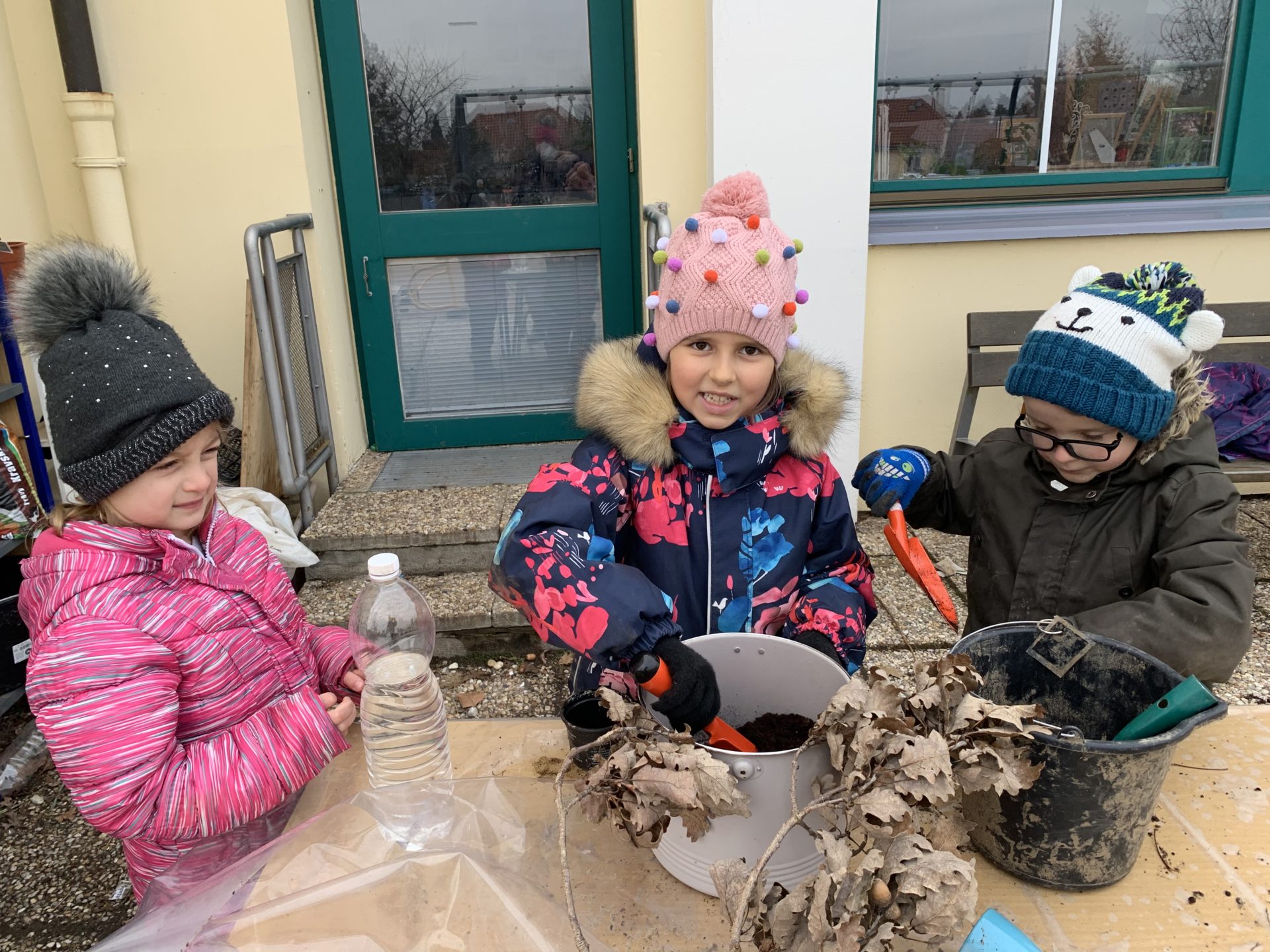Curious about Elementary and Early Childhood Foundations at the International School of Prague?
Join our Elementary (18 March) and Early Childhood Foundations (25 March) Virtual Opens Day, both at 12 noon. For more information and to register visit here.
Confessions of the ISP Outdoor Learning Coordinator
Ullassa – a Sanskrit word that does not have a literal translation in English – is a word that describes an awareness of, and feelings of, pleasantness associated with natural beauty. Here at The International School of Prague, our Outdoor Learning Program tries to instill this awareness in our young learners by helping them to look down to see what is crawling under their feet, look up to see what is soaring high above their heads and to observe the world around them – encouraging them to notice things that are obvious and also those hidden jewels that we find when we just look at little more closely. As well as our constantly evolving playground areas, we are incredibly privileged to be on the doorstep of the beautiful Divoka Sarka forest, so it is incredibly easy to step out and experience “ullassa” at any given opportunity. In under ten minutes, children can be building dens, observing wildlife or doing a myriad of different activities under the forest canopy. Children have the opportunity to be in nature and experience its many wonders for themselves.
Here at ISP our Outdoor Learning Program is constantly evolving to give children high quality experiences in nature. These experiences have proven to:
- develop reflective and inquisitive thinking along with problem-solving approaches in ‘real’ situations
- encourage holistic development of children
- develop resilience and adaptability in occasionally adverse circumstances
- allow children to become more able to identify hazards and risks
- develop a love, appreciation and respect for nature and all that is living
- develop an understanding of how we can look after our environment
- develop self-awareness, confidence and self-esteem
- develop collaborative-working and communication skills
- provide positive health benefits – both physically and mentally – and assist gross and fine-motor development
- develop a lifelong love of the outdoors.
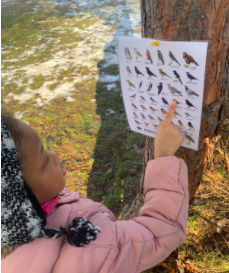
As the Outdoor Learning teacher here at The International School of Prague, every day is different. Of course there are aspects that are similar – and there is a certain element of routine just as there is to the changing seasons – but the individuality, the interests and the motivation that the children bring to each day, ensures that no day is the same.
One thing I can be sure of is that there will always be children standing in my classroom or banging on my door window as soon as recess starts, waiting to share their new idea, ready to feed the chickens or wanting to see the progress of a seed they have planted and left in my care. I am constantly in awe of the student’s motivation and commitment to work they have started in the garden, the ideas that they bring me and the thought that they put into projects. Some of the observations I have made in the past few months have been, children who have declared, “Eugh – mud, I’m not touching that!” being ankle high in muddy puddles trying to design a pond for wildlife a few months later; children who declared, “I’m scared of the chickens”, happily entering the chicken area and trying to feed the chickens by hand; children who retorted, “It’s just a bird, what’s interesting about that?”, running to me to tell me about the bird with the “tee-cher” call they heard high in the trees and children who have said, “Yuk, I hate getting dirty”, digging up worms for the worm compost bin they are creating.
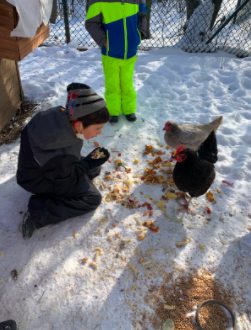
Often their resilience and openness to new ideas shines through, as well as the ability to be inspired and motivated by their friends, both in their own classes and in other grade levels.
Outdoor Learning in nature has the ability to take away those school divisions such as grade levels, and I constantly see children of different ages working together on projects. Outdoor Learning allows students to see that they are part of a whole. It gives them an appreciation and awareness for their community which in turn can help them to act more consciously.
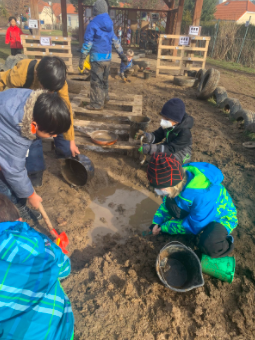
My days are filled with this enthusiasm for learning outdoors and in nature and it is a privilege to be the one who can facilitate these inquiries and take them further by encouraging questioning and research, providing resources and materials to enhance projects and often just listening and being there to give hints and suggestions of what to do next. It’s fascinating to see a different side of the children, and for those that sometimes struggle within the four walls of a classroom, it’s an opportunity to shine, share their skills and take responsibility.
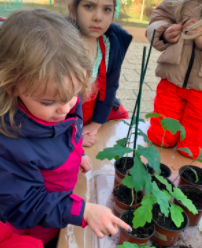
Close observation is a skill that we build over time by creating the time and space for children to be out in nature without any agenda or lesson plan. Yes, of course, we have certain skills and concepts that we have in mind when we take children outdoors, but these are things that happen in the midst of their enthusiasm and motivation in being outdoors, and most often these goals are surpassed as children take us off on a path of wonder and curiosity that we just could not have planned for them however hard we tried. The joy on a child’s face and that feeling of pride when they recognise a bird from the colour of its feathers, or actually see an oak tree growing from an acorn is priceless.
Of course there are challenges, right now we are on Distance Learning, but we still try to facilitate our program by sending seeds home for planting, that will hopefully come back to school to our garden and by encouraging bird spotting with a bird observation sheet. There is also inclement weather, but with this motto in mind, “There’s no such thing as bad weather, only inappropriate clothing” and parents supplying appropriate clothing, we have been outside as much as possible throughout the winter – taking care of the chickens, making art using natural materials and ice, building mini ice igloos and making bird feeders for our Bird Garden.
By committing to learning both inside and outside the classroom, here at ISP we are able to show children that learning occurs everywhere at all times – not just inside a classroom. We give children the understanding that learning comes in many shapes and sizes and it helps everyone to have the opportunity to learn in a way that works best for them.
By Kerry Craig, ISP Outdoor Learning Coordinator
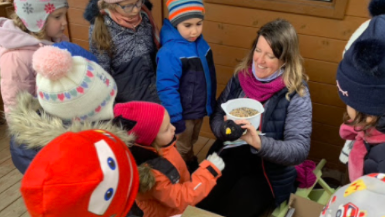
Kerry is originally from Scotland has been living and teaching abroad since 2000 in Europe and Asia. She has extensive experience as an educator and holds educational degrees from the Universities of Glasgow and Newcastle.
